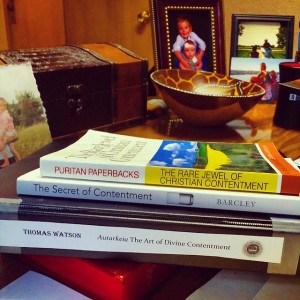From Walter Marshall’s Gospel Mystery of Sanctification:

Meditation on such things as these is indeed very useful to press upon our consciences the strictness of our obligation to holy duties, and to move us to go by faith to Christ for life and strength to perform them. But, that we may receive this life and strength, by which we are enabled for immediate performance, we must meditate believing on Christ’s saving benefits, as they are discovered in the gospel; which is the only doctrine which is the power of God to our salvation, and by which the quickening Spirit is ministered to us, and that is able to build us up, and give us an inheritance among all them that are sanctified (Rom. 1:16; II Cor. 3:6; Acts 20:32). You must take special care to act faith in your meditation; mix the Word of God’s grace with it, or else it will not profit you (Heb. 4:2). And if you set the lovingkindness of God frequently before your eyes, by meditating on it believingly, you will be strengthened to walk in the truth (Ps. 26:3); and, by beholding as in a glass the glory of the Lord, you will be changed into the same image, from glory to glory, even as by the Spirit of the Lord (II Cor. 3:18). This kind of meditation is sweet, and delightful to those that are guided to it by the spirit of faith, and it needs not the help of such artificial methods as the vulgar cannot easily learn. You may let your thoughts run in it at liberty, without confining them to any rules of method. You will find your souls much enlivened by it, and enriched with the grace of God; which cannot be effected by any other kind of meditation, though it be never so methodical, and curiously framed according to the rules of art.

 A beautiful section from
A beautiful section from 



